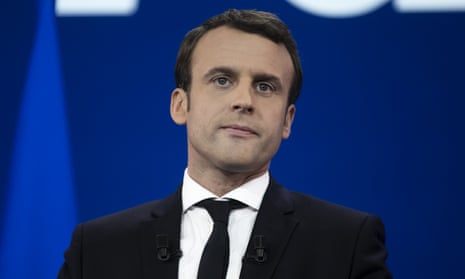Sunday 23 April was a historic day for France. Neither the main rightwing party (Les Républicains) nor the leftwing Parti Socialiste are through to the second round of the presidential election, which takes place on 7 May. It is also historic because the lead candidate going into the second round is the young head of a groundbreaking new political movement, En Marche! (Onwards!), which was launched only a year ago.
Emmanuel Macron and En Marche! have made it to the second round because over the past year they have been bold enough to take risks on many issues. Macron has dared to challenge the established French party-political system in order to find ways of meeting citizens’ expectations in a globalised 21st century.
Furthermore, Macron is proudly pro-European. He has taken the “risk” of a founding EU country of not just standing by its commitments to the EU, but proposing to strengthen them – at a time when most other candidates are making dangerous promises about withdrawing from the EU, reneging on important treaty commitments or toying with leaving the eurozone.
Reform of the EU is needed. Macron is proposing to work with his European partners to strengthen and develop it. He puts an end to years of ambiguity from the right, the left and the centre during which the political class, as in many other European countries, was effectively attending the European church without having any faith, nor courage, to defend what they had agreed in Brussels. If he is elected, these days will be over.
In particular, Macron understands the importance of the euro. He knows that it is a bold political project, going beyond monetary issues, and an important global reserve currency. While many candidates were focusing on the euro as the scapegoat for all of France’s (not insignificant) woes, and flirted with the idea of leaving the eurozone or blackmailing Germany and other partners, Macron had the courage to present a different vision for France, one that underlines the fact that the euro, is a shared currency, which brings with it both advantages and responsibilities.
Macron is convinced that sound public finances and bold structural reforms, if introduced in a socially fair way, are in France’s interest. These responsibilities are stated in the treaties, which have been jointly negotiated and then democratically ratified by all countries, including France. They must be respected. Far from simply being an ideological project this is a question of ensuring France’s and the EU’s global positioning.
Since the EU was founded, the Franco-German relationship has been its motor and Macron took a clear stance on this too: he wants to reinforce and strengthen this crucial relationship. Macron was brave enough to praise Angela Merkel’s refugee policy, a legal commitment of all EU countries, to underline the need for humanity and finding common solutions to difficult but urgent and tragic problems.
The vision Macron has of the world in 2017 is a realistic one: he refuses to exploit nostalgia or make empty promises. He believes France has great potential, and wants the country to fulfil it on both the European and the global stages. To share sovereignty at the European level is our best chance of actually remaining sovereign: not on paper but in reality. Macron took the time to explain that the challenges faced in the 21st century, such as terrorism and climate change, do not respect international borders. In order to be able to respond to these challenges, France needs to work with its European partners at the supranational level and to promote a cooperative world order.
The first round results show that many of France’s citizens are aware of these challenges and welcome a candidate who candidly faces up to them. The challenge now is to ensure that it is this open, future-oriented vision that triumphs in two weeks, rather than a closed nationalist one which would lead to turmoil and suffering, not just in France but throughout the EU. Macron is not the candidate of the establishment. By telling the truth, he respects the people more than his challenger. Marine Le Pen presents herself as a patriot but France, proud of its universal openness, does not belong to her tribe.
